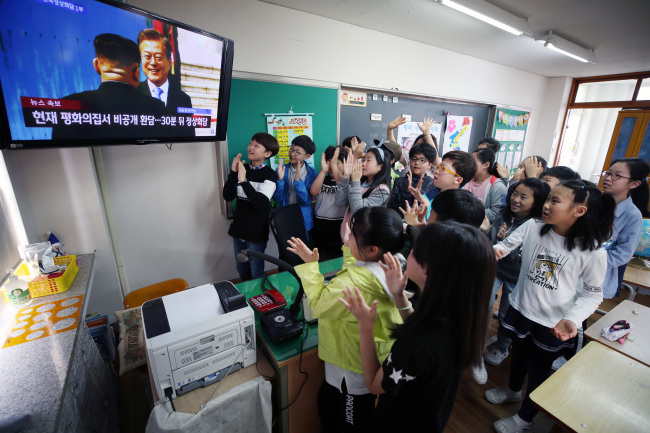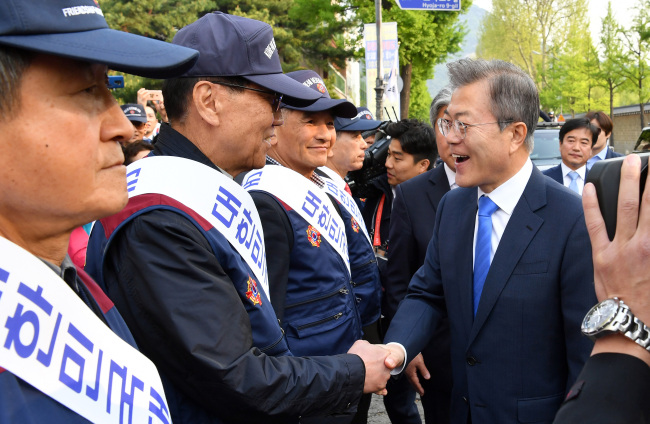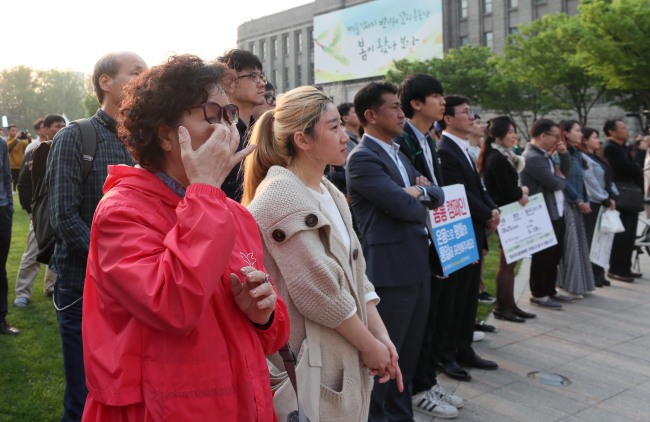[2018 Inter-Korean summit] South Koreans emotional after witnessing historic Moon-Kim meeting
By Claire LeePublished : April 27, 2018 - 16:18
Han Na-eun, a 30-year-old professional in Paju, Gyeonggi Province, normally spends her morning attending meetings, or preparing her next project at work.
On Friday, however, things were different. All of her coworkers stopped what they were doing, eyes fixed on TV for the historic moment President Moon Jae-in shook hands with his North Korean counterpart, Kim Jong-un.
The two leaders met at the heavily fortified demilitarized zone in the first summit for the two Koreas in over a decade.
“I have to say I was touched,” Han told The Korea Herald. “Everything about it was surreal. Throughout my 20s, I experienced two conservative governments led by Park Geun-hye, and Lee Myung-bak. I never imagined that I would watch any South Korean president and Kim Jong-un in the same TV shot. Everyone in my office was emotional.”
On Friday, however, things were different. All of her coworkers stopped what they were doing, eyes fixed on TV for the historic moment President Moon Jae-in shook hands with his North Korean counterpart, Kim Jong-un.
The two leaders met at the heavily fortified demilitarized zone in the first summit for the two Koreas in over a decade.
“I have to say I was touched,” Han told The Korea Herald. “Everything about it was surreal. Throughout my 20s, I experienced two conservative governments led by Park Geun-hye, and Lee Myung-bak. I never imagined that I would watch any South Korean president and Kim Jong-un in the same TV shot. Everyone in my office was emotional.”

Indeed, for many South Koreans, the summit also gave them their first chance to hear Kim Jong-un’s voice on live TV.
“It was very, very weird to hear Kim Jong-un’s voice on TV,” said Kim Kyung-ah, a 32-year-old mother in Seoul.
“I mean, I always knew that he existed. But today was the first time where I felt, ‘Oh my god, Kim Jong-un is a real person!’ Up until today, it always felt like Kim was some sort of a cartoon character. It was refreshing to see him talking about normal things like cold noodles, not nuclear weapons or wars.”
The summit also gave a sense of hope for South Korean business owners who were working at the Kaesong Industrial Complex, which the North operated with the South until Seoul shut it down in 2016 in response to Pyongyang’s rocket launch.
Sung Hyun-sang, a business owner who had a factory at the complex, said he is now hopeful that rapprochement on the Korean Peninsula will allow him to restart his fabric factory there.
“I’ve been forced to be unemployed for the last two years, and there were many moments when things were very tough,” he told The Korea Herald.
“The past government shut it down without complying with the law, and practically never provided us with any compensation. When President Moon was elected, I assumed that the inter-Korean relationship would improve. And to finally see him meeting Kim Jong-un in person this morning was very touching. I hope to go back to my normal days soon.”
North Korean defectors in Seoul were both delighted and skeptical.
“The North Korean government never cared for its people, and I know that because I’ve lived there,” said Lee So-yeon, who used to work as a soldier for the North Korean army. She escaped to South Korea via China in the late 2000s.
“I’m happy that this summit is taking place, and that we are finally talking about peace on the peninsula. I miss my hometown terribly. But at the same time I don’t trust the North Korean regime. I’m not sure if denuclearization that North Korea is talking about is the same thing as what the US or South Korea are talking about. And North Korea may always change their mind. They have a history of breaking their promises or deals.”

The summit also drew surprising support from one of the most conservative groups in South Korea. Some 6,000 members of the Korean Veterans Association, a group of former military personnel, some of whom fought in the Korean War (1950-1953), gathered in central Seoul on Friday morning to show support for President Moon before his departure to Panmunjeom.
“We are a conservative organization, there is no question about that,” said the spokesman of the organization on the condition of anonymity.
“But we believe that whether you belong to the political left or right does not matter when it comes to the issue of denuclearization. We support this summit because (as ex-soldiers) we believe what the Korean Peninsula needs, more than anything, is peace.”
North Korean leader Kim Jong-un is to meet with US President Donald Trump in late May or June, following Friday’s inter-Korean summit.
Mirae Baik, a Korean-American living in New York, said she thinks North Korea has an advantage in both Friday’s inter-Korean summit and Kim’s upcoming meeting with President Trump.

“The crazy thing about it is that you see the North Korean line-up and you know these guys. These people have been around for decades,” she told The Korea Herald.
“They have an institutional knowledge and bringing this wealth of past diplomatic talks to the table, whereas the US and South Korea are switching up their people at every meeting. So there’s no continuity on our side. I think it’s a huge advantage for North Korea.”
Kristin Pak, a Korean-American adoptee activist living in Seoul, said she teared up while watching Moon and Kim shake hands, talk and smile on Friday.
“The division of Korea divides people and families,” she told The Korea Herald. “In a lot of ways it’s the reason why so many emigrated away from Korea through various means, including adoption. Families shouldn’t be separated. The end of division and peace is just an overwhelming thought.”
Meanwhile, Han Na-eun said she could not help but pay attention to the way Kim Jong-un wrote the number seven in his message in South Korea’s Peace House guestbook.
She said unlike most Koreans, Kim wrote the number as “7” with a small horizontal line in the middle.
“I know many of my friends who have studied overseas write the number that way, apparently to avoid any confusion between one and seven,” she told The Korea Herald.
“I know Kim has studied in Switzerland during his childhood. This just gave me a sense that unlike his father and grandfather, Kim belongs to a new generation with childhood exposure to the outside world. Perhaps a new era has indeed begun.”
By Claire Lee (dyc@heraldcorp.com)










![[Hello India] Hyundai Motor vows to boost 'clean mobility' in India](http://res.heraldm.com/phpwas/restmb_idxmake.php?idx=644&simg=/content/image/2024/04/25/20240425050672_0.jpg&u=)








